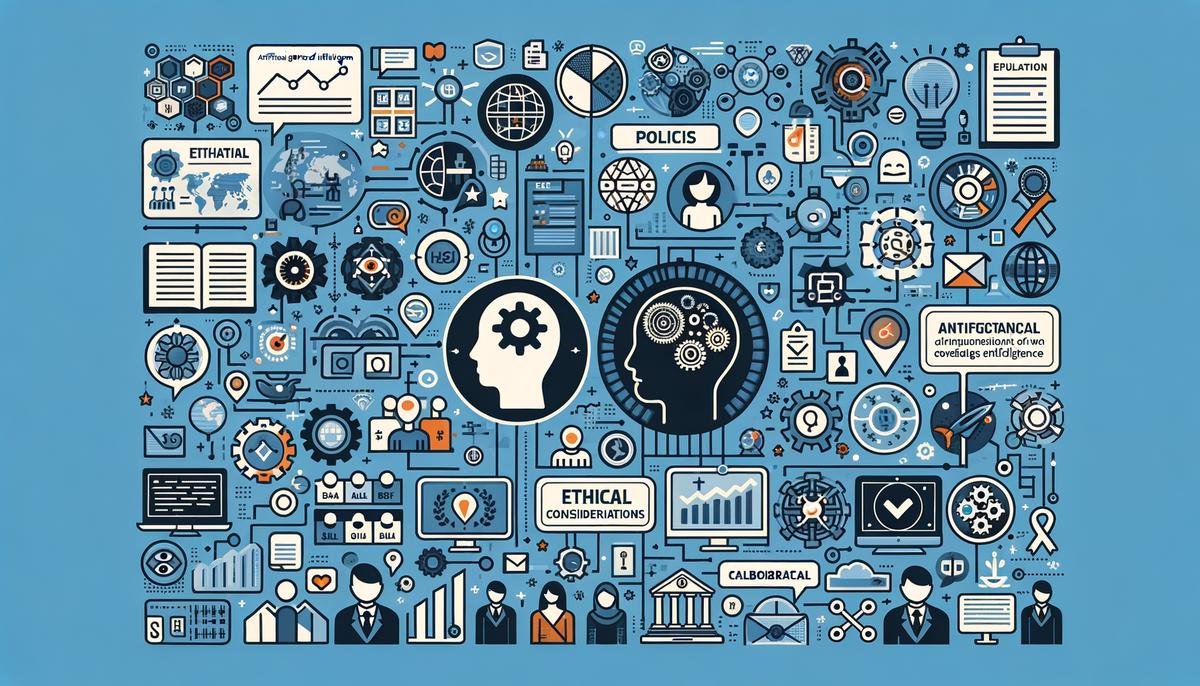Artificial General Intelligence (AGI) represents a bold step forward in our quest to integrate advanced technologies into everyday life. It’s reshaping how we think about artificial intelligence, moving us from narrow, task-specific applications to systems that can learn and operate across a broad range of activities, just like a human would. This exploration into AGI and its implications globally aims to shed light on both its transformative potential and the challenges that lie ahead, examining its role across various sectors and the international frameworks guiding its development.
The Emergence of AGI and Its Global Impact
AGI, or Artificial General Intelligence, is transforming technology worldwide, reshaping industries and societal operations. Unlike task-specific AI, AGI boasts cognitive abilities that span across various tasks, akin to human intelligence.
Venturing into AGI marks a pivotal shift. It promises to enhance decision-making processes, driving efficiency in sectors like healthcare, where it could deliver personalized treatment plans by analyzing patient data. In finance, AGI could detect fraud with unprecedented precision, safeguarding assets.
The development of AGI relies heavily on breakthroughs in machine learning and data analysis. It’s a blend of robust algorithms that learn and adapt, mirroring human learning. This learning capability is central to AGI’s potential to revolutionize technology, adapting solutions to new problems without human intervention.
However, realizing AGI poses significant technical hurdles. Crafting machines with human-like reasoning demands advances in computational power and algorithmic complexity. Plus, ethical considerations loom large – ensuring AGI’s decisions align with human values is paramount.
Collaboration on a global scale is key to AGI’s advancement. This involves pooling resources, knowledge, and expertise from around the world, fostering innovation. Tech giants and startups alike contribute to research, pushing the boundaries of what’s possible.
AGI could indeed redefine global technological landscapes, streamlining operations and offering insights previously deemed unattainable. Yet, its success hinges on overcoming technical challenges and navigating ethical dilemmas. The journey toward AGI is one of cautious optimism, promising a future where technology operates with a level of intelligence indistinguishable from humans.

International Policy Frameworks for AGI
Turning our attention to the structures supporting current international AGI (Artificial General Intelligence) policies, we dive into the intricacies that govern the developing frameworks around this groundbreaking technology. While AGI promises a future of highly intelligent systems capable of understanding, learning, and applying knowledge across various domains, it’s the scaffolding of policies internationally that will ensure its safe and equitable development and deployment.
Global Regulatory Perspectives on AGI
Different countries approach AGI with diverse strategies, reflecting their unique socio-economic, cultural, and political landscapes. The European Union, for instance, has taken proactive steps by proposing regulations that prioritize human oversight and transparency in AI systems, potentially extending to AGI in the future. This approach underscores the importance of creating systems that are not just intelligent but also align with ethical standards and contribute positively to society.
Across the pond, the United States has opted for a more decentralized strategy, encouraging innovation and development through industry-led standards and minimal regulatory intervention. This hands-off approach aims to foster rapid advancements in AGI technology while relying on existing frameworks in privacy, cybersecurity, and competition laws to address any emerging challenges.
International Cooperation and Standards
Acknowledging AGI’s potential global impact, international bodies like the United Nations and the IEEE (Institute of Electrical and Electronics Engineers) have started laying the groundwork for worldwide cooperation in AGI policy formulation. They emphasize the need for universal standards that not only accelerate AGI development but also mitigate risks associated with advanced AI systems. By fostering dialogue among nations, these organizations play a critical role in aligning global efforts towards responsible AGI creation and application.
Focus on Ethical AI and AGI
Ethics form a core pillar in the scaffolding of international AGI policies. With the profound implications AGI has for privacy, security, employment, and even societal values, crafting policies that prioritize ethical considerations is paramount. Key ethical guidelines being discussed on the international stage include ensuring AGI systems are transparent, equitable, and accountable. Moreover, there’s a growing consensus on the need for AGI to augment human abilities and improve quality of life, rather than replace human roles or exacerbate social inequalities.
Public and Private Sector Roles
The intersection of public and private sectors is another pivotal area in the framework of AGI policies. Governments are increasingly partnering with technology companies, academic institutions, and civil society to shape the trajectory of AGI development. These collaborations aim to leverage the agility and innovation of the private sector while ensuring public interests are protected through regulation and oversight.
As the journey toward realizing Artificial General Intelligence continues, the policies and frameworks that nations and international bodies are crafting today will set the stage for how this transformative technology unfolds. Balancing innovation with ethical considerations, safety, and public welfare remains a complex challenge, but one that is being navigated through thoughtful international collaboration and dialogue. The scaffolding of current AGI policies, while still under construction, is foundational to unlocking the potential benefits of AGI in a manner that is responsible, equitable, and universally beneficial.

Ethics and AGI: A Balancing Act
Understanding the Role of Ethics in AGI Development Through the Lens of Public Perception and Responsibility
As the horizon of artificial general intelligence (AGI) expands, the fabric of ethics becomes increasingly intertwined with its development. This connection is not merely a backdrop but a pivotal axis around which the wheel of AGI innovation spins. Amidst this complex interplay, two areas stand out: public perception of AGI and the ethical responsibility of developers and corporations in steering its evolution.
Public perception plays a critical role in the AGI narrative. It’s a reflection of society’s hopes, anxieties, and questions about a future where AGI becomes an integral part of daily life. How the public views AGI—whether with optimism for its potential to solve intractable problems or with concern for its implications on privacy, employment, and societal dynamics—shapes the path of AGI’s acceptance and integration into society. It raises the question: How can developers navigate these perceptions? The answer lies in transparency and engagement. By demystifying AGI, explaining its mechanisms, potential, limitations, and ensuring a two-way dialogue, developers can build trust and foster an informed understanding of AGI among the general populace.
Equally important is the ethical responsibility borne by developers and corporations. This responsibility extends beyond adhering to regulations; it encompasses a moral obligation to consider the long-term impacts of AGI on humanity. Developers are the architects of AGI’s capabilities, and corporations shape its application and reach. Together, they hold the power to influence the trajectory of AGI development profoundly. Ethical foresight is essential. It involves incorporating safeguards against biases, ensuring privacy, and making ethically sound decisions on AGI’s application areas. Moreover, there is a need for proactive measures to mitigate potential adverse outcomes, such as job displacement and socio-economic disparities, at the earliest stages of AGI design and deployment.
A collective ethical approach also implies fostering inclusivity in AGI development. By bringing diverse perspectives into the AGI conversation, from ethicists and social scientists to communities that may be impacted differently by its deployment, the development of AGI can be steered in a direction that respects and benefits all of humanity.
In conclusion, ethics and AGI development are inextricably linked, with public perception and ethical responsibility at the heart of this relationship. As AGI strides forward, navigating its course with ethical integrity, transparency, and inclusivity will be paramount. This will not only pave the way for AGI to achieve its transformative potential but will also ensure that its journey aligns with societal values and the greater good.

Collaborative Global Governance Models for AGI
In the quest to govern Artificial General Intelligence (AGI) on a global scale, a variety of collaborative models have emerged, aiming to harness its revolutionary potential while mitigating its risks. These models are designed to foster international collaboration, set standards, and guide the ethical deployment of AGI technologies. Understanding these collaborative efforts is crucial for navigating the future of AGI governance.
Multi-National Treaties and Agreements
At the forefront are multi-national treaties and agreements, which serve as formal commitments between countries to adhere to shared principles and guidelines on AGI development and deployment. These agreements often set out ethical standards, security protocols, and shared objectives, aiming to create a uniform approach to AGI globally. The power of such treaties lies in their ability to bring diverse nations onto a common platform, promoting international cooperation and ethical harmonization.
International Standards Organizations
International standards organizations play a pivotal role in shaping the technical and ethical frameworks for AGI. Bodies such as the International Organization for Standardization (ISO) and the Institute of Electrical and Electronics Engineers (IEEE) develop guidelines and standards that influence global AGI practices. These standards cover a wide range of issues, from safety and privacy to interoperability and ethical considerations, providing a solid foundation for global AGI development and application.
Public-Private Partnerships (PPPs)
Public-Private Partnerships (PPPs) represent a collaborative model involving government entities, industry leaders, academia, and non-profit organizations. These partnerships are critical in pooling resources, expertise, and insights from various sectors to address the multifaceted challenges of AGI governance. By blending public oversight with private sector innovation, PPPs aim to accelerate AGI development while ensuring it aligns with public interest and ethical standards.
Global Consortia and Coalitions
Global consortia and coalitions of tech companies, research institutions, and civil society organizations have emerged as influential platforms for AGI governance. These groups work together to research, debate, and advocate for responsible AGI development and policies. Through their collaborative efforts, they aim to influence both public policy and industry practices, ensuring that AGI advances in a manner that is safe, ethical, and beneficial for all of humanity.
Open Source and Community-Driven Initiatives
The AGI ecosystem also benefits from open source projects and community-driven initiatives. These efforts encourage transparency, collaboration, and innovation by making AGI research and development accessible to a broader audience. Open source projects facilitate the sharing of knowledge and technology, helping to democratize AGI development and ensure a wider community has a stake in its governance.
Academic and Research Networks
Academic and research networks provide a critical forum for exploring the complexities of AGI governance. Through conferences, journals, and collaborative research projects, these networks facilitate the exchange of ideas and findings among scholars, scientists, and policymakers. They play a vital role in advancing understanding of AGI’s implications and crafting informed approaches to its governance.
As AGI continues to evolve, these collaborative models offer pathways to harness its potential while addressing the ethical, social, and technical challenges it presents. By fostering international cooperation, setting shared standards, and encouraging inclusive dialogue, these initiatives aim to guide AGI development in a direction that benefits humanity as a whole. The future of AGI governance will undoubtedly require continued collaboration, innovation, and vigilance to navigate the complexities of this transformative technology.

The Future of AGI and International Relations
As we consider the onward march of Artificial General Intelligence (AGI) and its place in the tapestry of global diplomacy and international relations, a nuanced understanding emerges. AGI, with its boundless potential, stands at the frontier, not merely as a technological marvel but as a pivotal force in reshaping the dynamics of international dialogues and cooperation.
In the realms of diplomacy and international relations, AGI introduces an era of unprecedented efficiency and novel methodologies in communication, decision-making, and problem-solving. Nations are poised to leverage AGI systems for real-time translation services, breaking down language barriers that have historically impeded diplomatic relations. This immediate and accurate translation capability enables a more profound and nuanced understanding among nations, fostering a global environment where dialogue is not lost in translation.
Moreover, AGI’s role in predictive analytics heralds a significant shift in strategic planning and international security. Through the analysis of vast datasets, AGI can anticipate geopolitical shifts and inform policymakers of potential outcomes with remarkable precision. This foresight could lead to more informed decisions, proactive conflict resolution strategies, and tailored diplomatic approaches, thereby reducing the risk of misunderstandings and escalating tensions.
The implications for crisis management and international aid are equally profound. AGI systems, designed with advanced predictive models, could effectively forecast natural disasters and humanitarian crises, enabling preemptive measures and coordinated global responses. The efficiency and effectiveness of international aid efforts could be significantly improved, with AGI guiding logistics, resource allocation, and on-ground strategies to mitigate the impact of these crises.
Yet, the path to integrating AGI within international relations is fraught with complexities. The disparity in technological advancements across nations raises concerns about unequal benefits from AGI, potentially exacerbating existing inequalities and tensions. The challenge lies in fostering an international environment that encourages equitable access to AGI technologies and collaborative efforts in advancing these systems for the common good.
Furthermore, the development and deployment of AGI in diplomacy and international relations necessitate a robust framework of ethical guidelines and governance structures. The establishment of international agreements and regulatory bodies to oversee the ethical use of AGI in global diplomacy is imperative. These frameworks must ensure that AGI systems uphold the principles of transparency, accountability, and respect for international law and human rights.
In conclusion, as AGI steers the future of international relations and diplomacy, it holds the promise of a more interconnected and understanding global community. The potential to streamline communication, enhance decision-making, and elevate crisis response efforts stands in stark contrast to the challenges of technological disparities and ethical governance. As nations navigate these waters, the collective aim should be to harness AGI’s potential while safeguarding against its risks, ensuring a future where technology serves as a bridge rather than a barrier in the global diplomatic arena.

As we unravel the complexities of Artificial General Intelligence and its pivotal role in global technology landscapes, it’s clear that its advancement offers a beacon of progress, innovation, and improved quality of life worldwide. However, the path forward requires thoughtful consideration of ethical standards, equitable technology access, and the fostering of international cooperation to ensure AGI benefits humanity as a whole. Embracing AGI’s potential while thoughtfully addressing its challenges stands as a testament to our commitment to a future where technology enhances human capabilities, opening new avenues for growth, understanding, and collaboration across the globe.



